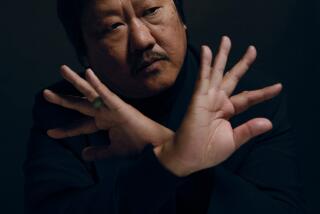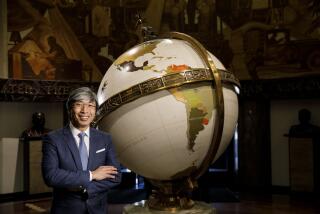WORLD REPORT PROFILE : David Tang : HONG KONG’S FLAMBOYANT ‘EMPEROR’ : ‘I want to be an honest broker between China and the West,’ says the businessman, who runs the elegant China Club and a clothing emporium.
HONG KONG — David Tang is an entrepreneur, a socialite, an opportunist, a character.
Largely shaped by British culture, yet feeling the pull of China as the 1997 turnover nears, he embodies every facet of Hong Kong. Instantly recognizable in his trademark Chinese silk suit and with his omnipresent cigar, Tang has a talent for synthesizing East and West, then playing them off each other.
“I like to remind myself I am Chinese, though I like the British,” he recently told a London newspaper. “Ultimately, I have to be on the side of China. The future lies there.”
Tang created the China Club, Hong Kong’s answer to the old colonial clubs established by British traders more than a century ago, as a nod to China’s future and Hong Kong’s role in it. In a dining room straight out of 1920s Shanghai, Hong Kong’s new generation of taipans draw their Ming Dynasty chairs up to marble-topped tables as wooden ceiling fans disperse rising curls of cigar smoke. The murmur of deal-making is punctuated by the clink of silver chopsticks on china.
But the club thumbs its nose at the mainland as well. Paintings by China’s new wave of artists send an irreverent message: One shows a traditional-looking Mao rubbing shoulders with Whitney Houston. The Long March Bar is filled with Mao kitsch meant to arouse nostalgia, not nationalism. In the entryway is a portrait of Tang with his good friend and Beijing’s worst enemy, Hong Kong Gov. Christopher Patten, both in 19th-Century dress.
As if he stepped out of the painting, Tang sweeps by in his black silk suit and slippers, explaining his plans to open China Clubs in Beijing, London and perhaps, he winks, Los Angeles too.
“The aim is to glorify China, to bring its traditions the recognition they deserve,” he says with a gesture that sends cigar ash flying. “I want to create an empire.”
Forty, divorced with two children, David Wing Cheung Tang is a would-be emperor who wants everyone to wear his new clothes. Not content to be the only one in town wearing traditional Chinese dress, Tang has opened Shanghai Tang, an emporium selling Chinese styles with a twist. There are Mao jackets in velvet, Mongolian cashmere sweaters in lime green and orange, watches with Mao’s waving arm as the second hand. And Tang is his own best advertisement.
“I made a point of making it cheerful,” he says, flipping up the hem of his black suit jacket to reveal a fuchsia lining with a large Shanghai Tang label. “The world needs a little humor.”
Tang is full of it, and it shows in the name of the store. Shanghai Tang is a triple pun: Tang, in English, means distinctive flavor. In Chinese, it sounds like the word for riverfront , evoking Shanghai’s famous Bund. And the traditional garment is called a tang zhang , or Tang suit.
The store’s name reveals both his marketing strategy and the fundamental paradox behind it: A traditional Chinese suit will seem novel in the West. And only after the fashion has been embraced overseas, he says, will it sell well in China. His ultimate goal is a club and store smack dab on its namesake Shanghai riverfront.
“There’s an old Chinese saying,” Tang mumbles around his cigar. “‘Local ginger is never hot.’ It’s got to come from elsewhere to be considered good.”
The growing presence of China chic on Paris runways--high-collared cheongsam dresses, slit to the hip, jackets and blouses with frog-button closures--suggests that Tang’s timing is right. His photo album boasts pictures of Oliver Stone smiling uncertainly in a Tang suit. Other buyers include Kevin Costner and international financier James Goldsmith.
And while he’s transforming “Made in China” into a tony trademark, Tang aims to teach the mother country a thing or two about a market economy.
“Chinese,” he says, “don’t understand packaging.”
Tang certainly does. When he was shipped off at 14 to boarding school in England, he learned the importance of first impressions the hard way. Equipped with an impeccable tailor-made suit and one perfect sentence in English, he went for an admissions interview at Harrow. The headmaster asked him if his journey had been pleasant, and he replied: “Hello, my name is David Tang.”
Despite the false start, Tang ended up studying philosophy at London University, and he now speaks in posh Oxbridge tones. He wanted to be a professor, but his grandfather told him to go to law school and gave him money for an apartment in London so he would. Tang lost the money in a casino. When his grandfather came to visit, he borrowed a friend’s apartment and hung his own family pictures on the wall.
“Later I won the money back,” he says with a mischievous smile. “I hit number 4 in roulette four times--and bought an even grander flat.”
Today, Tang’s well-appointed library includes first editions of the 100 books that essayist Cyril Connolly declared every person should read. He loves T.S. Eliot, plays piano solos with the Hong Kong Philharmonic and taught philosophy at Beijing University.
As one who is equally at home in Britain and Beijing, Tang can poke fun at the motherland in a way others can’t. The Mao-mocking paintings at the China Club would not go over at the genteel British club across the square. Who else could send out invitations for a shop’s launch commanding: “Joyful store opening. . .you come!” Neon-colored T-shirts at Shanghai Tang declare: “Confucius say: Foreign tiger not as powerful as local worm” and “No two tigresses in one cave.”
Neither worm nor tiger, Tang is the ruler of the middle ground.
“I want to be an honest broker between China and the West,” he says, suddenly earnest. “I’d love to get together the Prince of Wales and Deng Xiaoping.”
But the middle ground can sometimes seem like a no-man’s-land. Tang moves in the oldest circles of Oxbridge and Hong Kong but indulges in the self-promotion of a parvenu. “It saves millions in advertising,” he points out.
He also courts both British and Chinese leaders, but he may not enjoy the rewards of either camp after 1997.
“I’m a businessman, not a politician,” he says.
Tang is full of contradictions that are becoming more pertinent as Hong Kong’s 1997 reversion to China approaches. Tang the businessman, the gambler, the honest broker is placing his biggest bets on Hong Kong’s ability to bridge the gap between Britain and China.
“Hong Kong has weathered storms in the past,” he observes. “We’re clever. We’ve worked with one master before--the British. We can work with another.”
More to Read
Sign up for Essential California
The most important California stories and recommendations in your inbox every morning.
You may occasionally receive promotional content from the Los Angeles Times.










